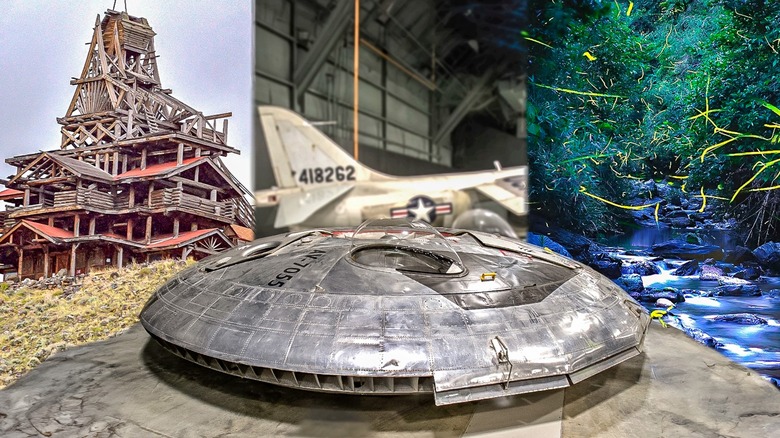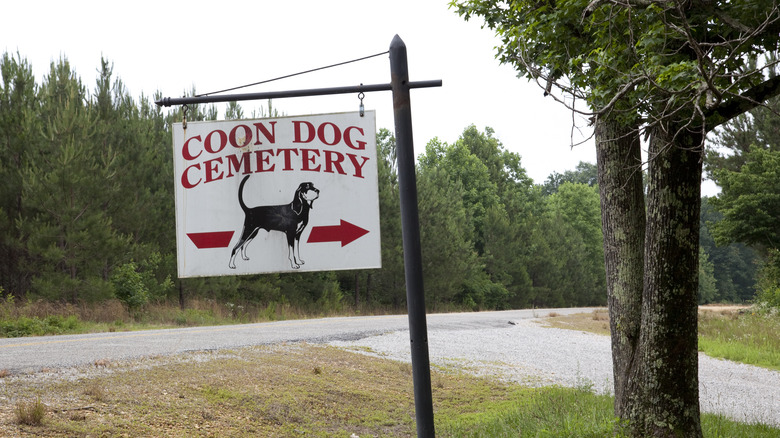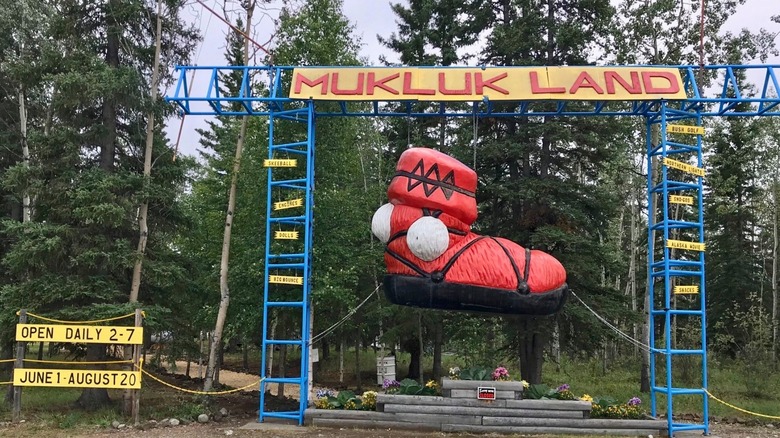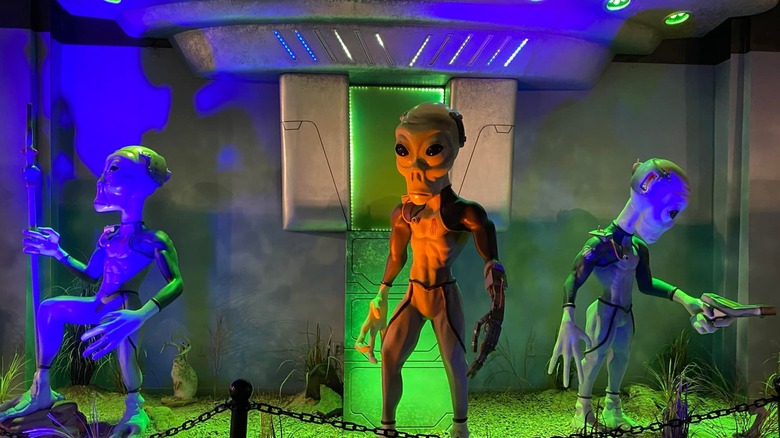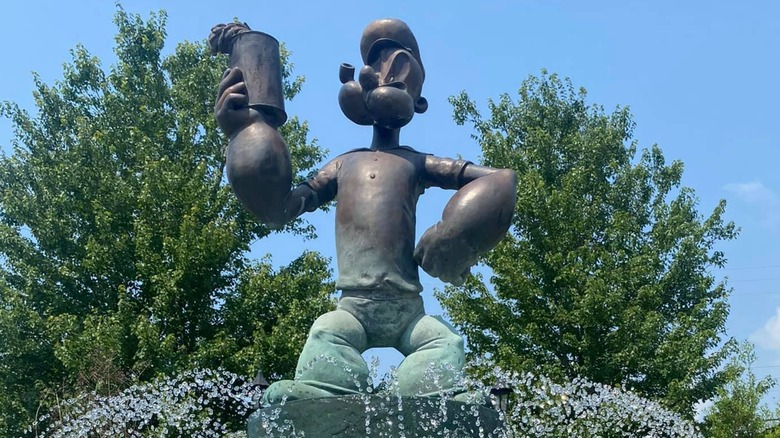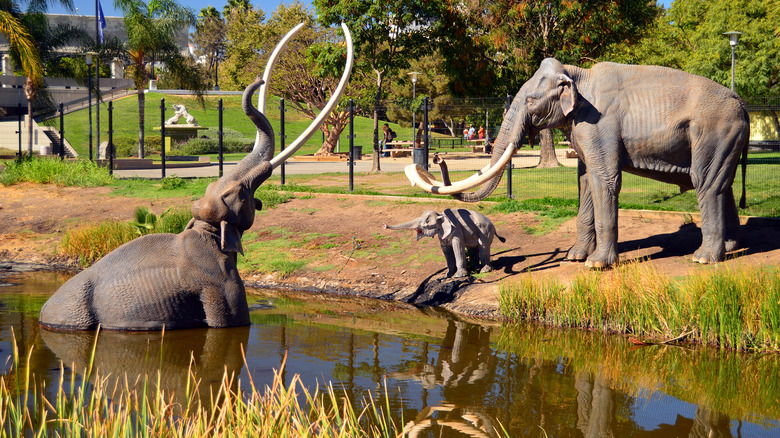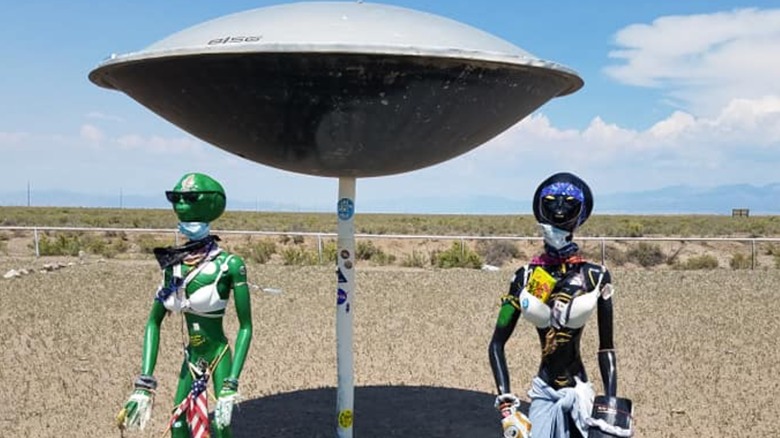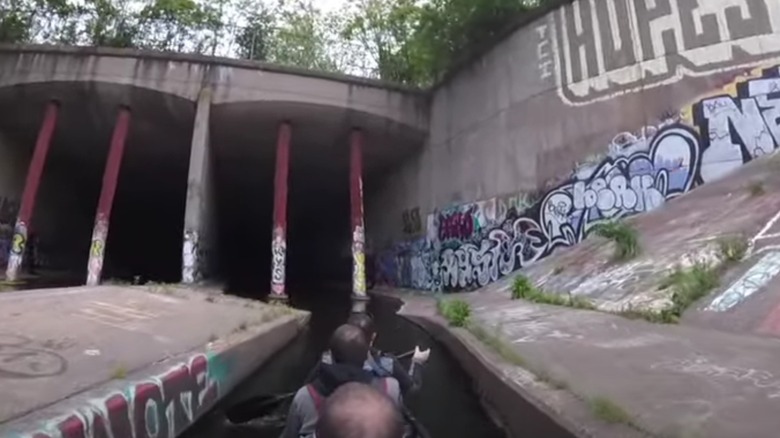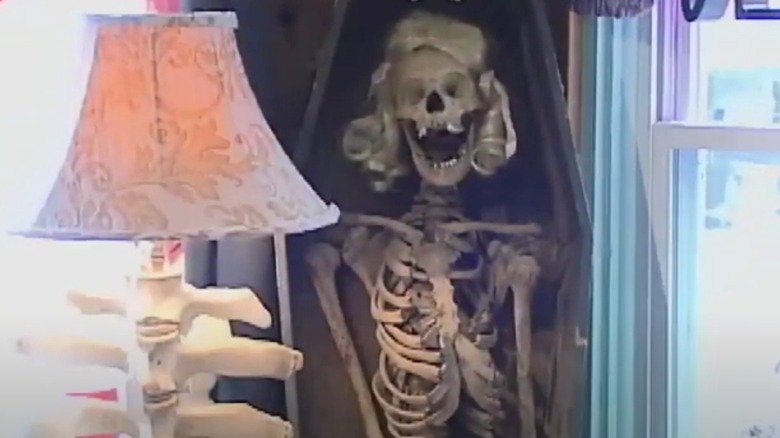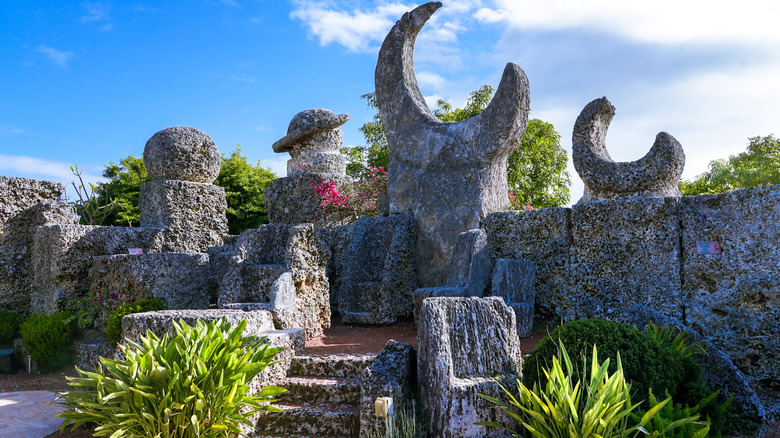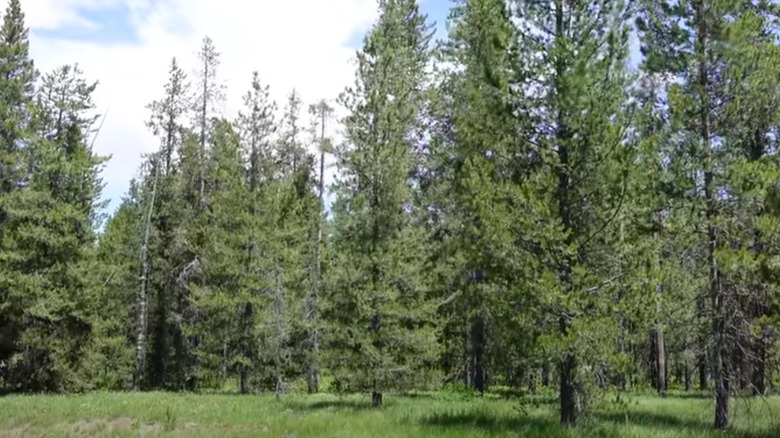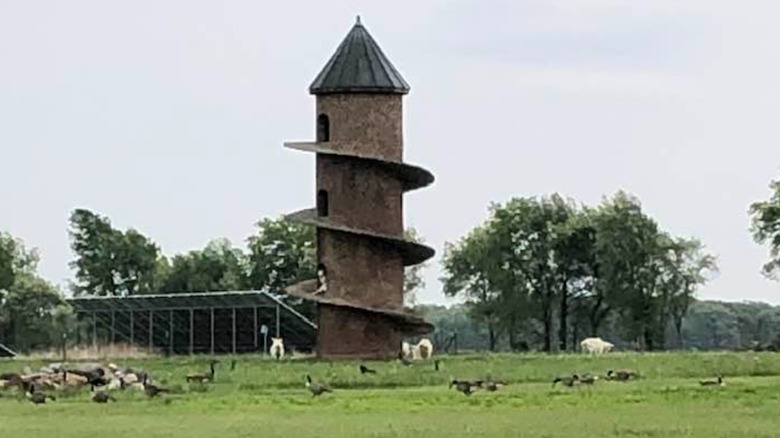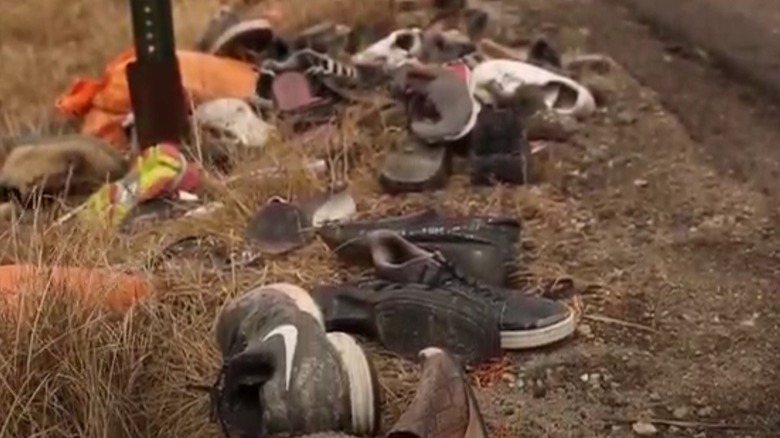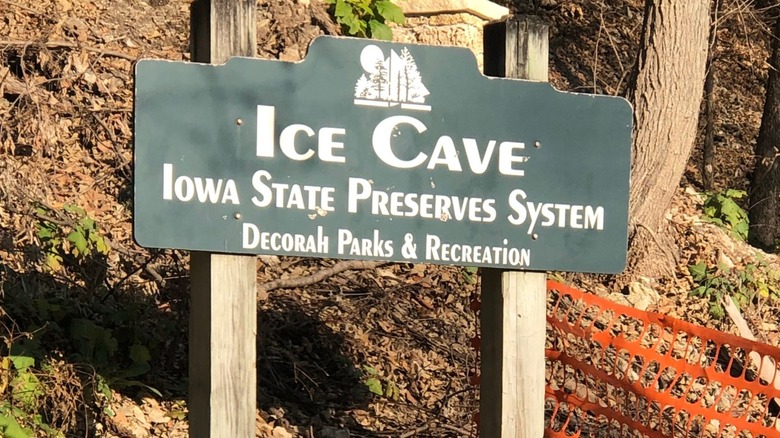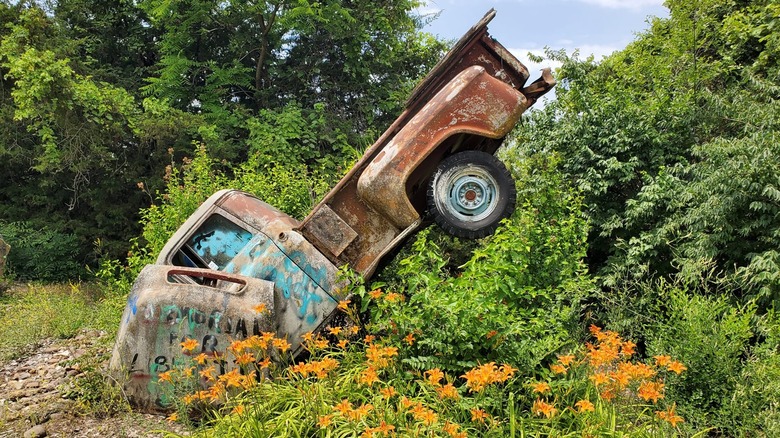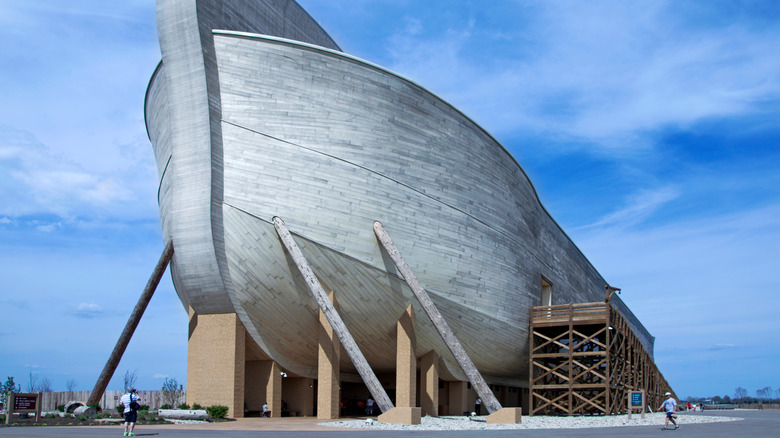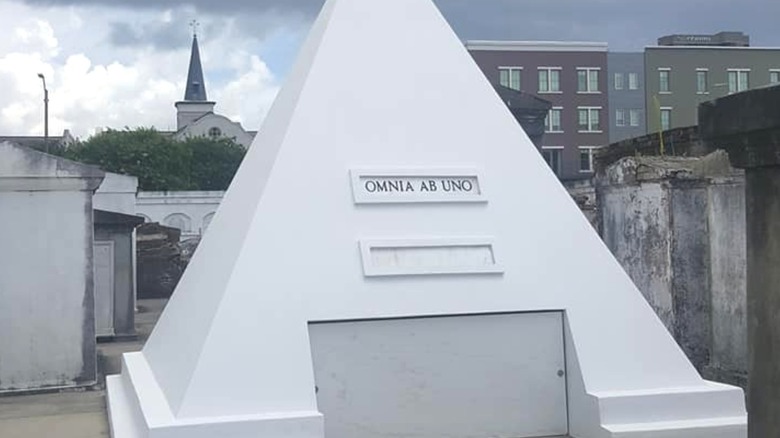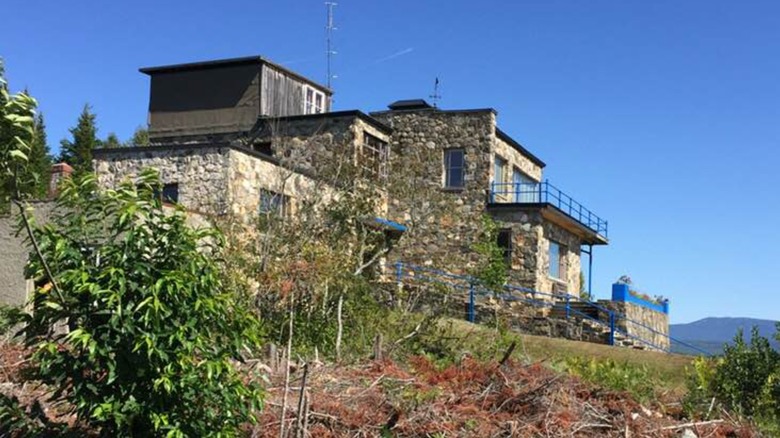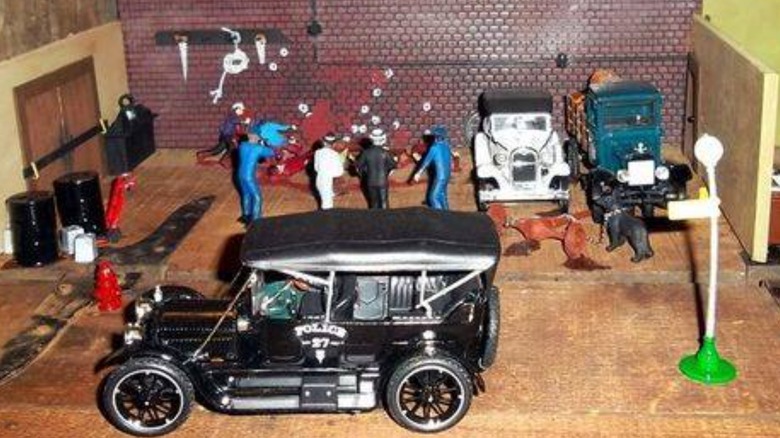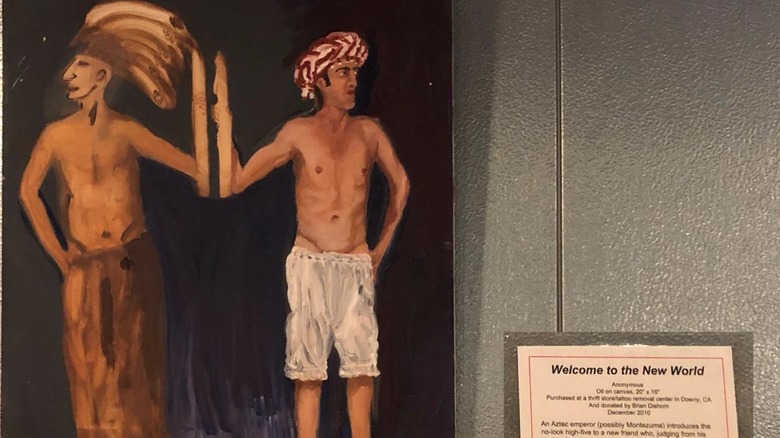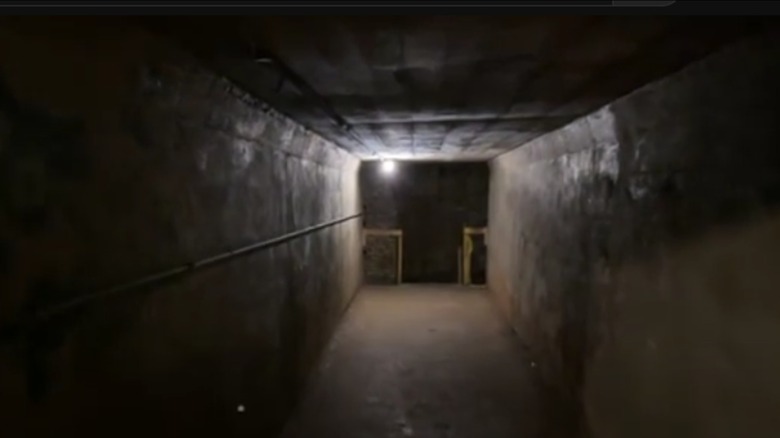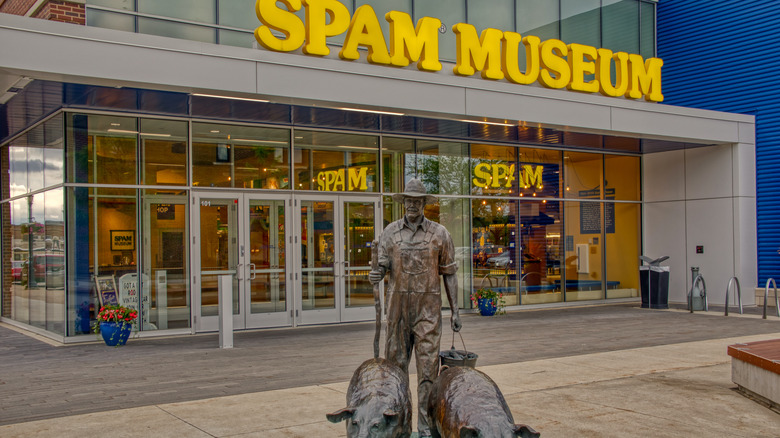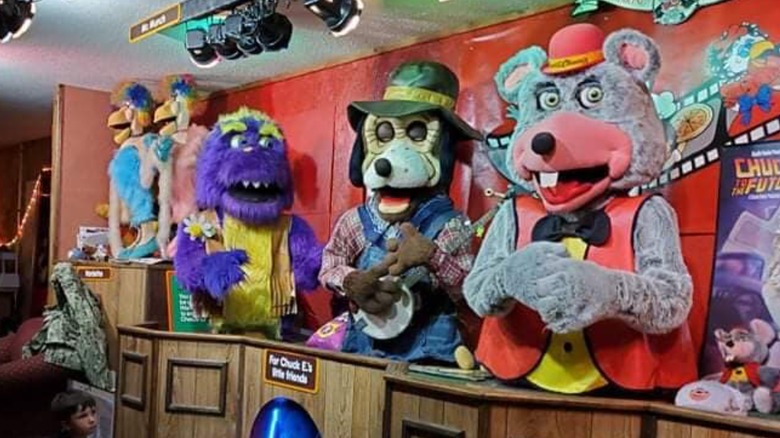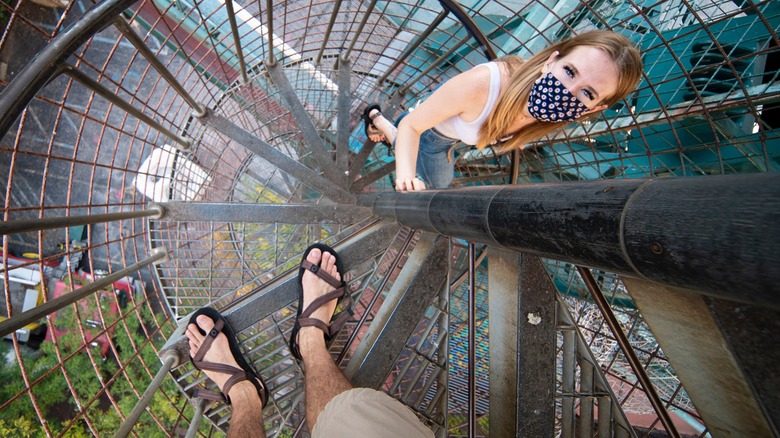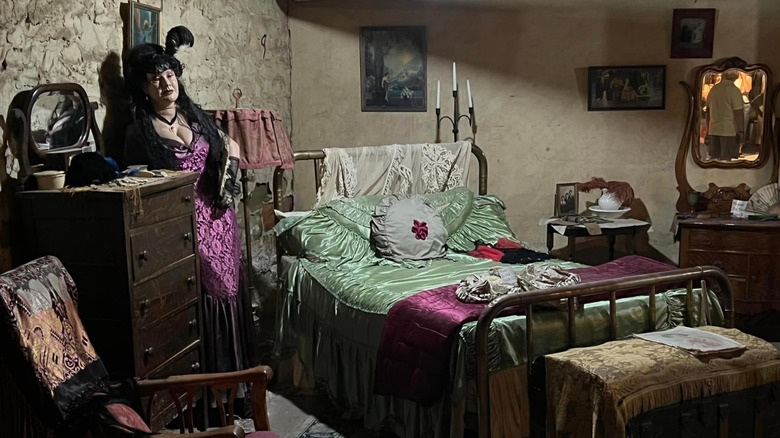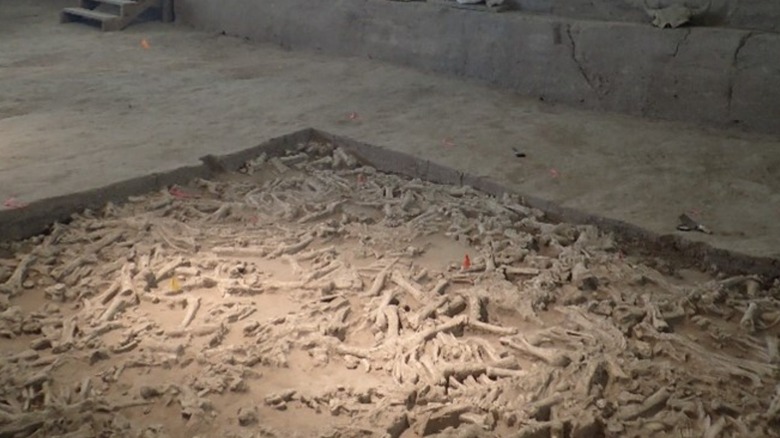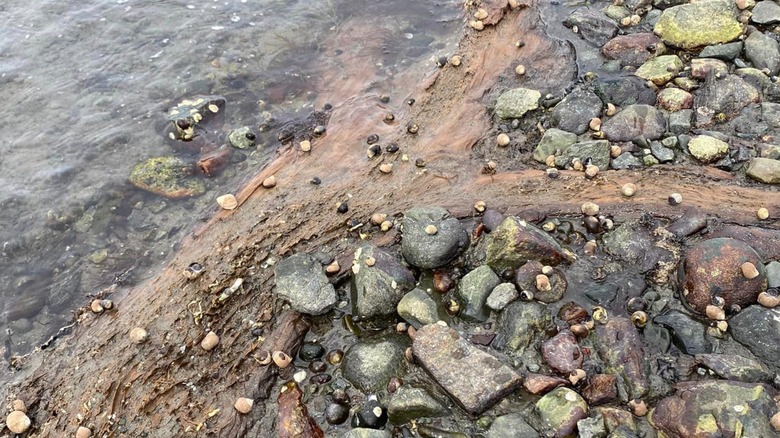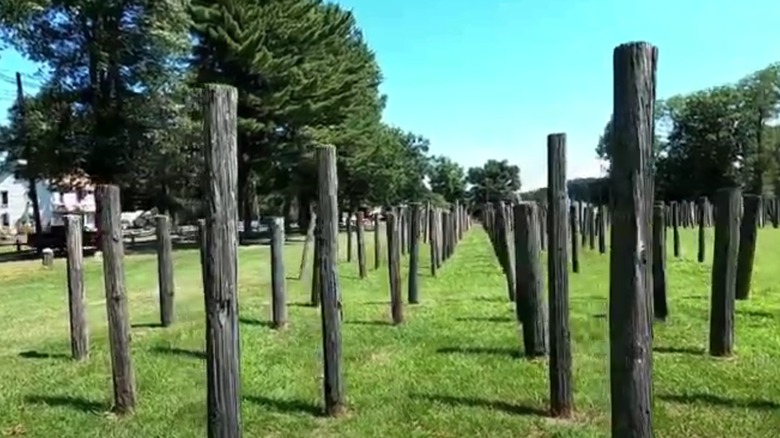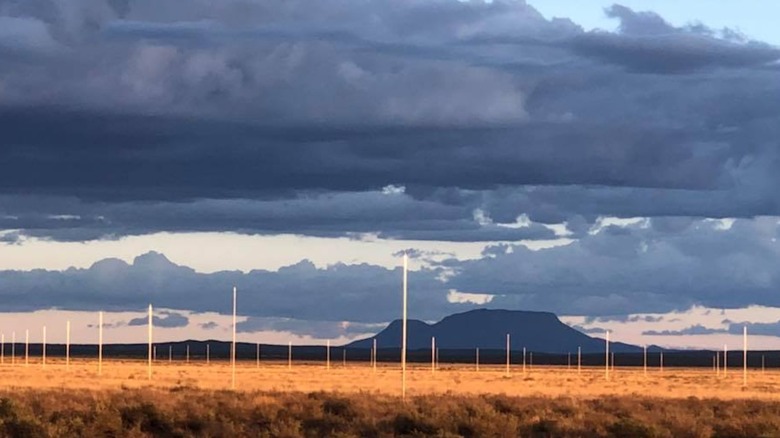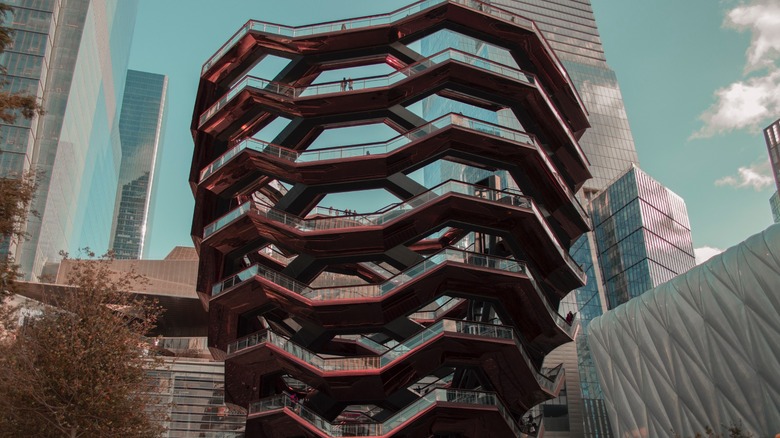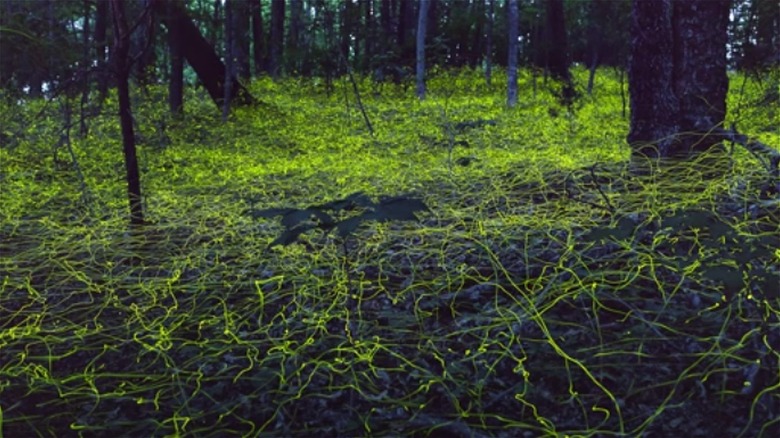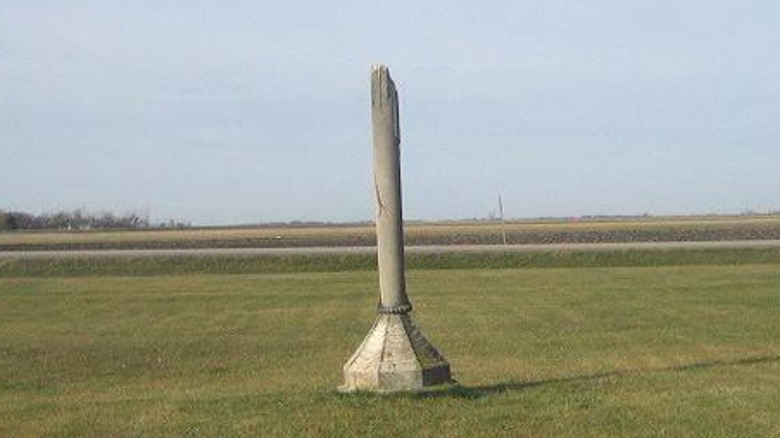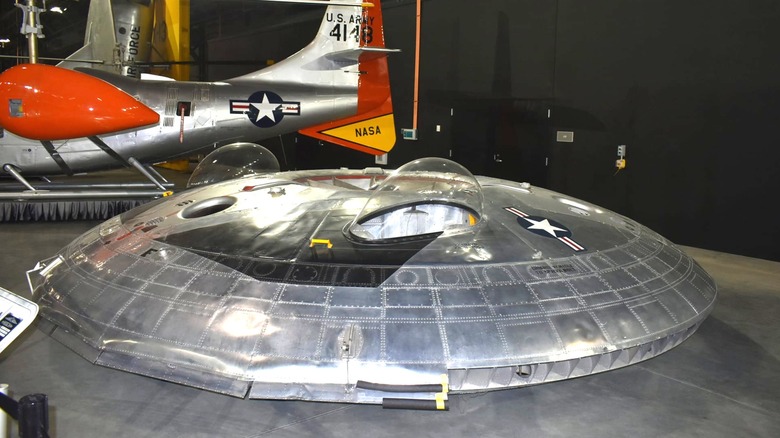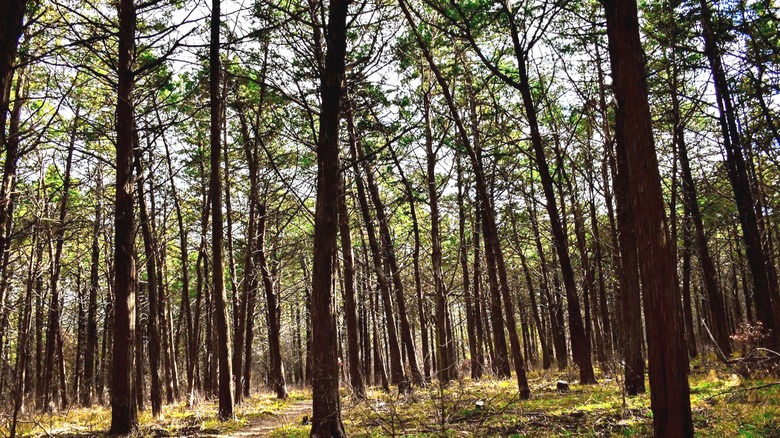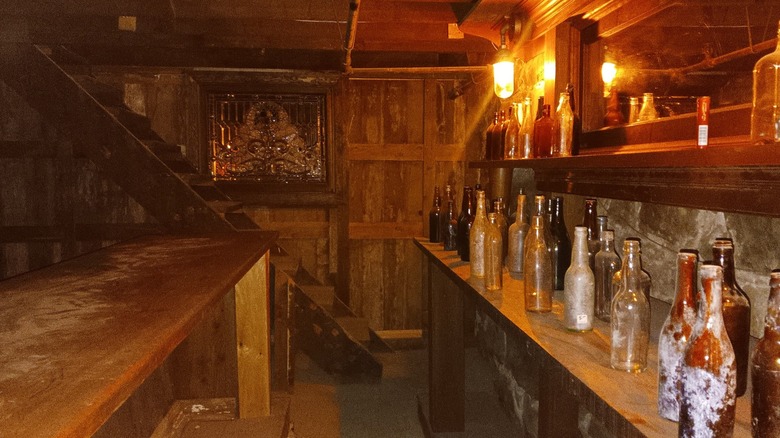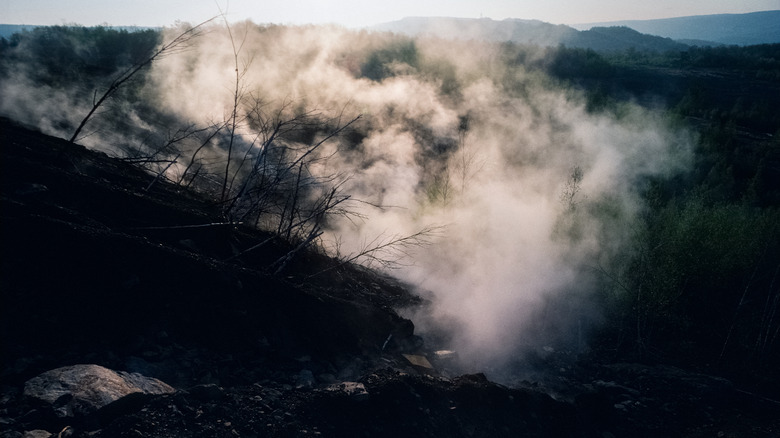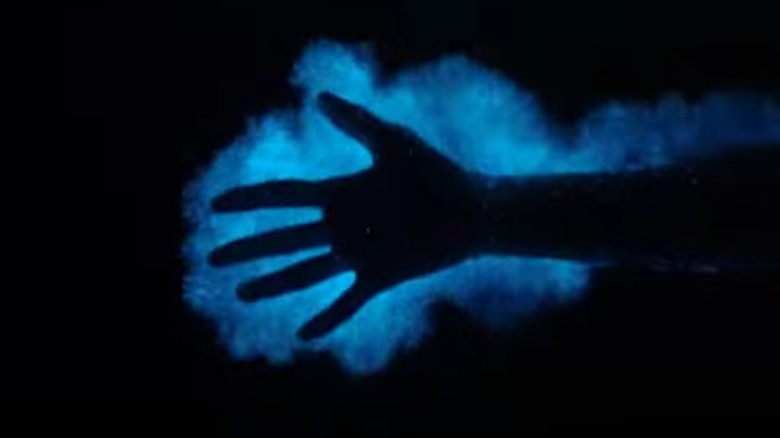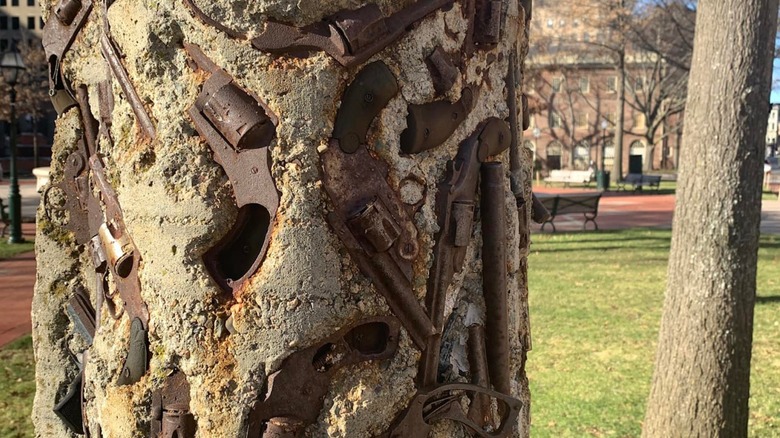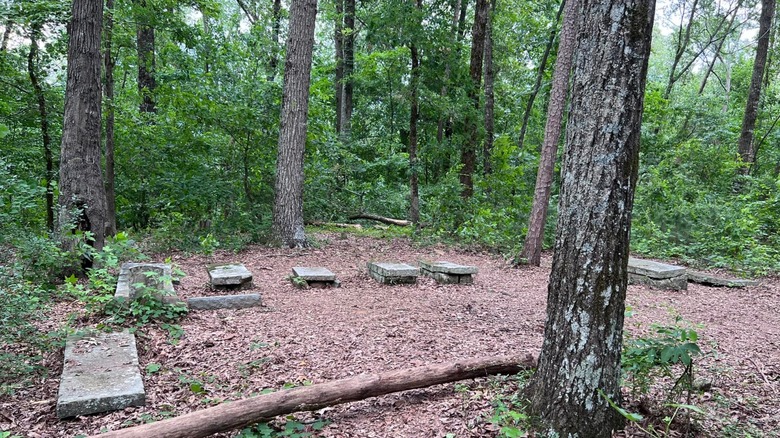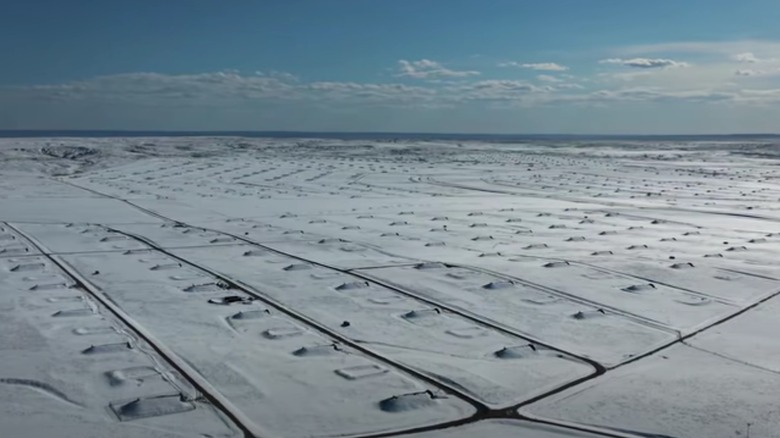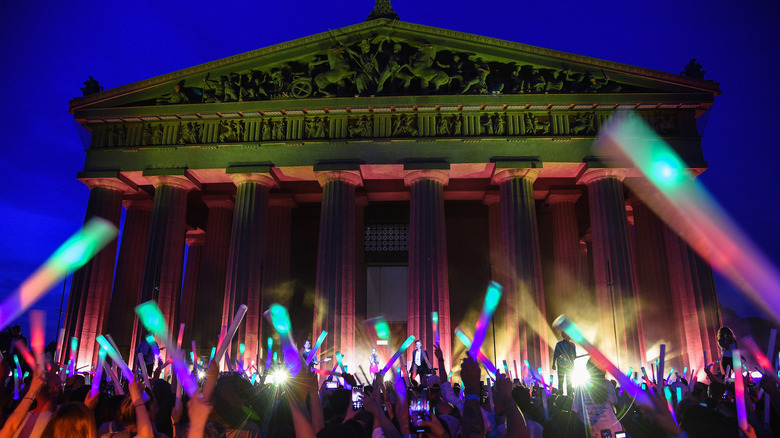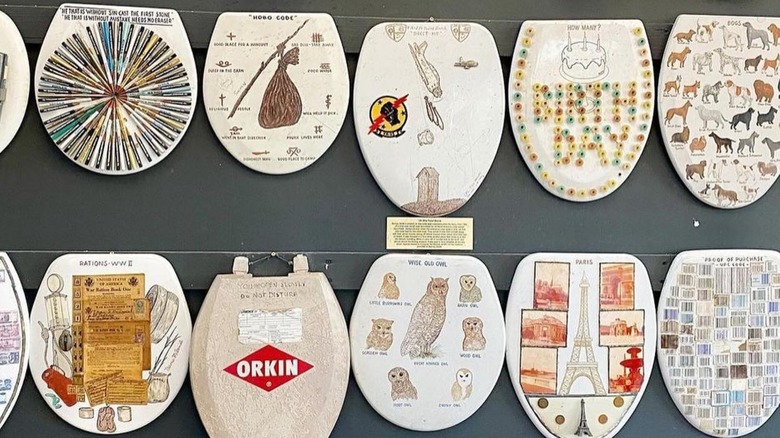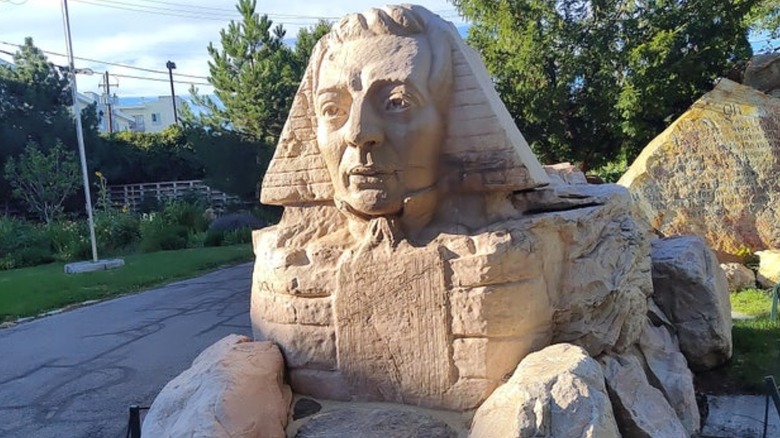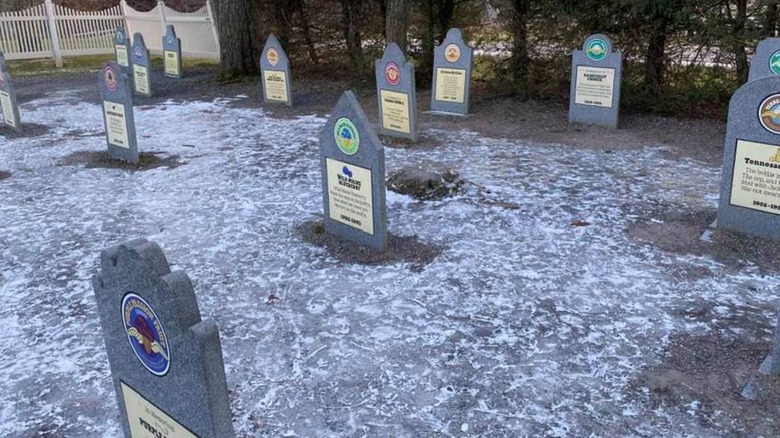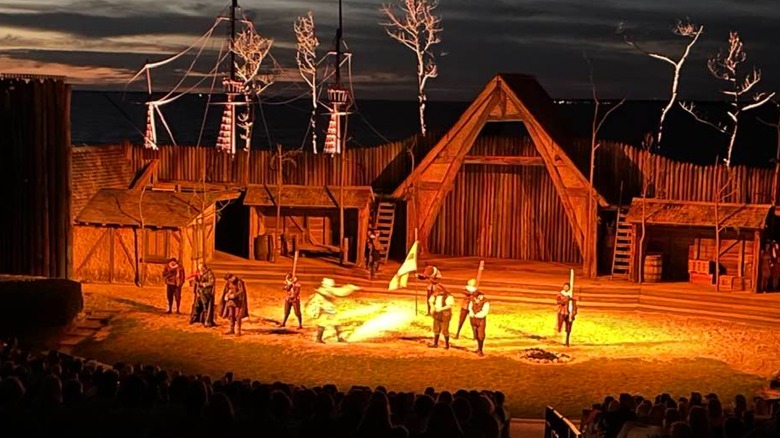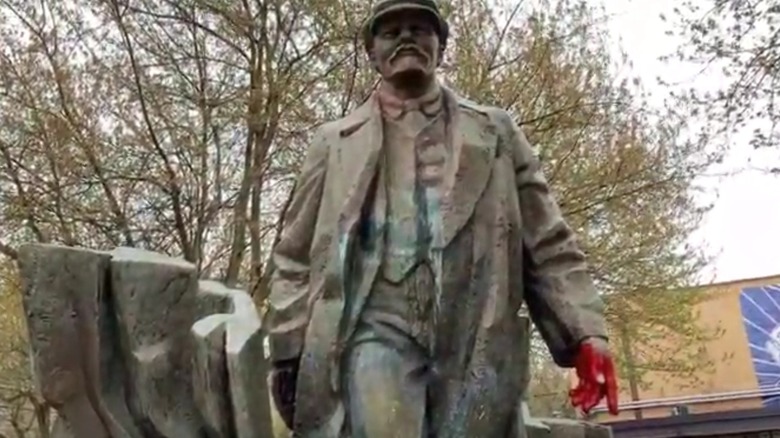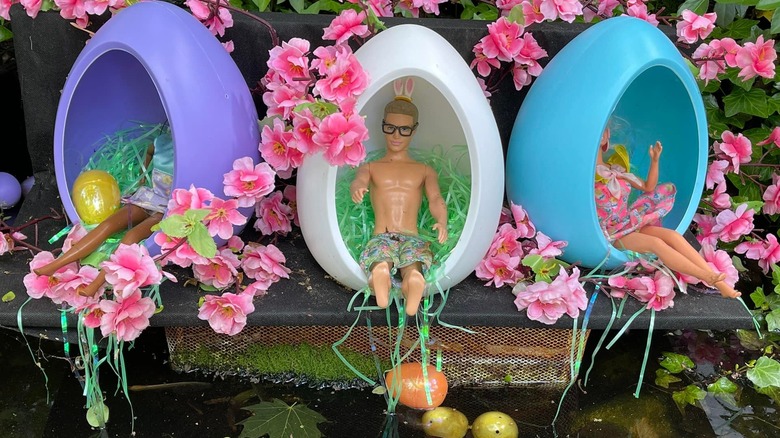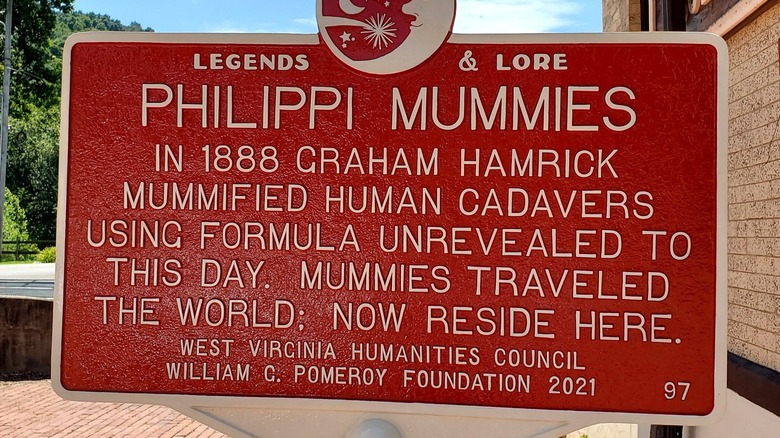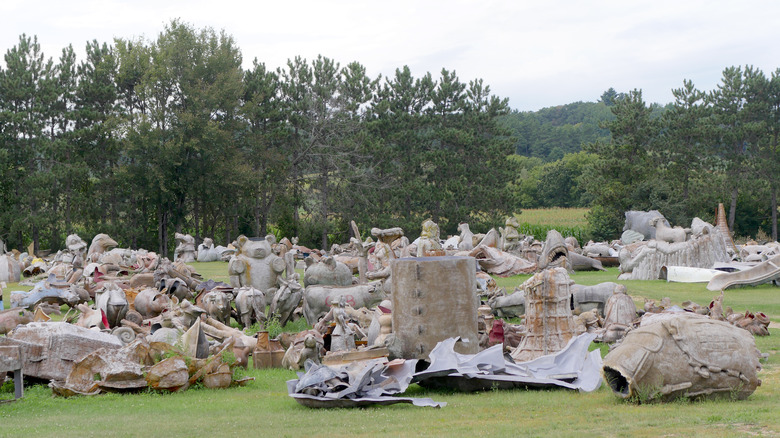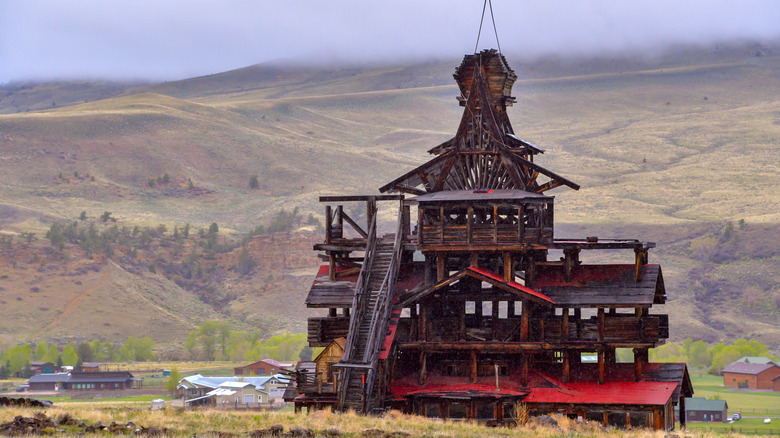Where To Visit The Most Bizarre Tourist Attraction In Your State
One of the great things about living in the United States is that if you're in the market for a good road trip and can't get enough of the quirky, offbeat, or downright odd, all you have to do is look around. The U.S. countryside is a veritable jackpot when it comes to eccentric hidden gems from the magnum opuses of obsessive country folk artists to echoes of macabre histories that will haunt your dreams.
While every state has its share of homespun roadside attractions, we've combed the country for the most head-scratchingly odd among them. From Florida's Coral Castle, an elaborate reminder of love's potential in the grasp of artistry, to Hawaii's green sand beaches, the perfect spot to admire jewel-stoned sands and stunning blue waters. Hang onto your car snacks as we look into the most bizarre attractions you can find lurking in every corner of the country.
1. Alabama: Coon Dog Cemetery
They say all dogs go to heaven. But did you know there's a unique resting place in the wilds of rural Alabama for beloved hunting dogs to spend eternity in? The whole thing started with a guy named Key Underwood in 1937 when he honored his late best friend Troop by laying him to rest on the hunting grounds the pair had come to love through their long years together. Other hunters followed suit, and the Key Underwood Coon Dog Memorial Cemetery was born.
2. Alaska: Mukluk Land
While visiting Alaska to behold the beauty of its vast, still untamed wilderness and take in the breathtaking sight of the Northern Lights, make time for the state's oddball roadside attraction, Mukluk Land. A sort of junkyard folk art DIY amusement park built around a giant mukluk, this folksy attraction offers amusements like skeeball, a bounce house, and mini-golf. There's also a quirky collection that includes Korean War artifacts, a place dubbed "Tok's first jail," a wishing well, vintage cars, and Santa's rocket ship.
3. Arizona: The Thing Museum
Not to be mistaken for the notoriously handy Addams family member or the eponymous monster flick star of the same name, the inspiration for this museum was a mummified creature crafted by artist Homer Tate, whose desiccated oddities graced many a carnival sideshow during the mid-20th century. But the true genius of The Thing Museum is how its owners have spun it into a work of pure modern American mythology gold with a grand conspiracy theory linking dinosaurs, alien mind control, World War II, and even Stonehenge.
4. Arkansas: World Spinach Capital
The sleepy town of Alma, Arkansas, has a nutrient-rich claim to fame, and they're not shy about letting the world know. Once home to the now-defunct Allen Canning Company, which allegedly produced most of the world's spinach at one time, Alma declared itself the "World's Spinach Capital" in 1987. The declaration was an affront to the residents of Crystal City, Texas, who had awarded themselves the title several decades prior. Nonetheless, the leafy interloper community proudly boasts several Popeye statues and a spinach-themed water tower that indicate they're not backing down.
5. California: La Brea Tar Pits
Here's your window into prehistoric Los Angeles that's so surreal it inspired a timey-wimey NBC sci-fi series. La Brea is an Ice Age paleontological research site that has coughed up millions of well-preserved fossils in its dark, bubbling pools of tar through the years. For visitors who behold the seeping oil of La Brea that has brewed up through the earth since saber-toothed tigers and wooly mammoths roamed the earth, it's a hauntingly beautiful sight to behold.
6. Colorado: UFO Watchtower
Regarding UFOs, most folks tend to align with either Scully or Mulder. And for those who want to believe, there's a perfect spot for eyeballing any potential extraterrestrial visitors thanks to one Colorado woman's kitschy UFO Watchtower. According to the owner, the area has been a hotbed of UFO sightings dating back to the 1570s, when the conquistadors wrote about them in their journals. Located in San Luis Valley near Hooper, this observation tower gives guests a 360-degree view of the desert so they don't miss out on UFO sightings. It's also home to lots of space-themed junk art and camping for the Spaced Out Music & Arts Festival.
7. Connecticut: Subterranean Canoeing at Park River
If you enjoy canoeing and love experiencing strange and eerie spaces, a float down Connecticut's Park River will be an absolute dream. A tributary of Hartford's Connecticut River, Park River once flowed through Bushnell Park and past the Capitol building. To help mitigate annual spring flooding, the Army Corps of Engineers began burying the river in the 1940s, rerouting it through an underground conduit near the Mark Twain House. The trip, which runs for about three miles, is not for the faint of heart, with one New York Times reporter comparing it to a trip down the river Styx.
8. Delaware: Oddporium
A chimera of museum and curiosity shop, The Odditorium is home to a dazzling array of dark and unusual curiosities that include collections of radium glass and gas masks, Amelia the cycloptic pig, and a medically-articulated Victorian Era skeleton named Lizzie. After the company store co-owner Ken Schuler worked for a closed-up shop, he and his wife Beth decided to put their quirky collections to good use and opened up the Odditorium. For Beth, educating visitors on the history of electroshock and psychiatric medicine is all in a day's work.
9. Florida: Coral Castle
Born in Latvia in 1887, immigrant Edward Leedskalnin came to the United States for a fresh start after his beloved noped out the day before their wedding. He decided to channel all those feelings into something productive. He used his inherited stonemason craftsmanship to single-handedly carve an elaborate monument to his lost love from more than 1,100 tons of coral rock between 1923 and 1951. Guests who tour the Stone Garden museum and learn about the significance of each Coral Castle monument using audio stands in four languages.
10. Georgia: Babyland General Hospital
Kids who grew up in the 1980s will likely remember the excitement of the original Cabbage Patch Kid craze. But for the LPNS (Licensed Patch Nurses) at Babyland General Hospital in Cleveland, Georgia, the Cabbage Patch craze continues today. Guests can tour the grounds of the "hospital" where Cabbage Patch Kids are delivered for free to learn about the CPK birds and bees. Specifically, how Bunnybees pollinate the fabled Magic Crystal Tree named Mother Cabbage and, with the help of Imagicillin, delivers her vacant-eyed children into the waiting arms of happy children around the world.
11. Hawaii: Green sand beaches
One of only two green beaches in the United States and one of only four of their kind in the world, the sand of Papakōlea Beach gets its decadent color from a semi-precious silicate mineral called olivine that once erupted from the island's cinder cone volcano. You can find this stunning beach in an area known as the South Point Complex, also home to one of the island's first settlements. If you plan to check out the jewel-toned sand, you'll need some decent hiking boots — it's illegal to drive by car.
12. Idaho: Zone of Death
Sure, the Bermuda Triangle is out there, vortexing ships and planes into a parallel universe. But there's a more corporeal threat lurking in Idaho's borders, a threat ominous to warrant the name "Zone of Death." Located deep in Yellowstone, this dense wilderness is said to be some of the wildest country left in the U.S., home to more grizzly bears than trails. According to Michigan State University Law Professor Brian Kalt in his essay "The Perfect Crime," the 50-square mile tract stands outside of any legal jurisdiction thanks to a constitutional federal districting loophole, making it theoretically a prosecution-free zone — at least, from an academic standpoint.
13. Illinois: Goat Tower
Illinois couple Dave and Marcia Johnson were flipping through a wine magazine when they spied an architectural design so inspiring they just had to build one of their own. Assembling 5,000 bricks, 276 spiral staircase steps, and one copper roof later, they were the proud owners of a 31-foot tall six-story goat tower — the first of its kind in the U.S. and one of only a few brick goat towers in the world. The tower is home to a happy crew of Saanen milk goats, and the owners are happy to welcome anyone who messages them to set up a visit.
14. Indiana: Shoe Corner
Why and how shoes end up abandoned remains a mystery for the ages. But one lonely corner in Indiana has become so much of a sole magnet that the place has earned the sobriquet "Shoe Corner." Located at the intersection of 109th Avenue and Calumet Street in Hanover Township, Indiana, the spot has been gathering shoes for decades, spawning countless threads of local lore surrounding its origin story through the years. Whether it's local tradition or some paranormal sneaker-summoning force, it's a worthwhile spot to rubberneck even if you don't plan to chuck a wedge out the car window.
15. Iowa: Decorah Ice Cave
Thanks to a quirk of geology, visitors to one Iowa state park can get a taste of Luke Skywalker's Hoth adventures even in the dead heat of summer. Although it's a reasonably tiny cave accessible only by a small crack, the frozen Decorah Ice Cave is open to the public, who are permitted to crawl inside and experience the wonder of the cave's ice-covered walls year-round. In fact, according to Decorah Parks and Recreation, the ice is thickest from late summer through early fall. Enter at your own risk, as the floor can be slick, and falling rocks are not unheard of.
16. Kansas: Truckhenge
Anyone traveling the United States for quirky roadside attractions long enough will start to see a few recurring themes — the world's largest balls of twine, spook lights, and houses shaped like flying saucers show up repeatedly across the American landscape. But one of the most utterly American phenomena is the art of replicating Stonehenge with everything from boats to plastic rocking horse toys. Among the best in the lot is Kansas' Truckhenge, which is exactly what it sounds like it is. The property is open to the public, with an esteemed past guest list that includes the Sister Wives and old Captain Kirk himself.
17. Kentucky: Ark Encounter
For many folks living inland, their first sight of oversized watercraft like superyachts, cruise ships, and shipping vessels can be wonder-inducing. But drive down the right road in the landlocked state of Kentucky, and you could find yourself face-to-face with a boat of (nearly) Titanic proportions on dry land. You haven't stumbled into a dried-up lakebed — it's actually meant to serve as a life-size replica of Noah's ark, part of the faith-based family park Ark Encounter that boasts ziplines, a zoo, and three interior decks' worth of Biblically-inspired attractions.
18. Louisiana: Nick Cage's Pyramid Tomb
With their ornate historic gravestones, sculptures, and above-ground vaults, New Orleans cemeteries are among the most beautiful in the world, a fitting tribute to the lives and heritage of those they honor. It's a sight that has captivated countless visits through the years, even inspiring actor Nicolas Cage to purchase two burial plots of his own and plant a 9-foot pyramid atop them. Such an acquisition is the standard operating procedure for Cage, whose list of past splurges includes a pet octopus, a pair of castles, and shrunken pygmy heads.
19. Maine: Orgonon
If you've ever pondered the strange lyrics of Kate Bush's "Cloudbusting," you may be surprised to learn the song is based on a strange, complicated, and myth-entwined tale of Austrian-American psychoanalyst William Reich's pseudoscientific psychosexual research at The Orgonon Research Laboratory. There, he engaged in controversial experiments in pursuit of his belief that an invisible life force called orgone could be manipulated to produce rain. Now a museum, Orgonon is open to visitors ages 12 and up only for, perhaps, obvious reasons.
20. Maryland: Nutshell Studies of Unexplained Deaths
Lovers of true crime and tiny things are invariably delighted when they stop by the City Chief Medical Examiner's office in Baltimore. There, they'll find an oddly whimsical collection of small scenes representing a series of various homicide scenarios. First created by "mother of forensic science" Frances Glessner during the peak Perry Mason period of the 1930s and 40s, each diminutive detective diorama depicts a dastardly deed in detail — a precursor to the 3D software modeling homicide police use today. Although these artistically rendered designs are viewable by appointment only, you can check a handful of them virtually thanks to the Smithsonian Institute's 360-degree Nutshell Studies viewer.
21. Massachusetts: Museum of Bad Art
Few human experiences are as universal as the impulse to create. But for every Van Gogh or Rembrandt, there are thousands of grandmas toiling away on their next portrait of a Yorkshire terrier and novice art restorers who unwittingly transform priceless works into comic relief. For those who embrace this kitschier side of the art world, the Museum of Bad Art exists to make us feel ever so seen. Blossoming from the private collection of one bad art lover, the non-profit museum has acquired 800 pieces, many of which can be viewed on the Museum of Bad Art website. However, around 40 works can be viewed in person for free at Dorchester Brewing Co. in Boston.
22. Michigan: Grand Traverse Hospital Tunnels
Many states have at least one abandoned hospital or asylum that's long been bedeviled by spicy backstory-fueled haunting rumors. But few are as primed for Stephen King adaptation as Michigan's The Village at Grand Traverse Commons, a swanky residential phoenix built on the former grounds of Traverse City State Hospital and asylum. Fans of the paranormal or just plain spooky can tour the grounds' more haunted spots, including a walk through the underground steam tunnels and men's ward basement, complete with a rundown of employees' claims that the cottages tend to groan.
23. Minnesota: Spam museum
SPAM may have been out of vogue among the general public for a few decades, but it still has its share of devotees in the world. Besides remaining a culturally important food to many Hawaiians, the iconic canned meat has retained a cult following through the years. For the more hardcore SPAM acolytes of the world, no trip to Minnesota would be complete without a pilgrimage to the SPAM Museum, where admission is free, and guests are treated to such quirky exhibits as a measurement tool that allows visitors to measure their height in SPAM cans. You can take a free virtual tour.
24. Mississippi: Showbiz Pizza Animatronics
Long before Freddy Fazbear tormented his first security guard, lucky birthday kids dreamed of the ultimate '80s kid jackpot — a celebratory trip to ShowBiz Pizza or its erstwhile nemesis Chuck E. Cheese. While the latter is still around today, most generation Alphas will never know the unique blend of terror and wonder from an encounter with first-gen pizza place animatronics. But if you can afford the inevitable counseling sessions, schedule an appointment to stop by Smitty's Super Service Station in Little Improve and check out the musical stylings of the original three-stage Rock-afire Explosion band.
25. Missouri: City Museum
Part psychedelic junkyard art playground, part real-world game of Chutes and Ladders, St. Louis's City Museum is an assault on the senses in the best way imaginable. A constantly-evolving interactive work of art meant to inspire, delight, and thrill, this 600,000-square-foot museum built atop an old shoe factory features hidden surprises around every corner crafted by artisans from around the world. Ten-story slides, a Frankensteinian Wurlitzer theater organ, a vast collection of outhouse artifacts, and seemingly endless tunnels that twist and wind through three stories of giant tree trunks and caves are just the tip of the iceberg.
26. Montana: Havre Beneath the Streets
Easily one of the country's most intriguing underground destinations, Havre Beneath the Streets is a tribute to the town's unique history. Named for Le Havre, France, by the turn of the century, the Wild West frontier settlement featured an underground mall home to its rather colorful underbelly. After much of the city burned down in 1904, even the legit business owners started operating underground during the reconstruction period. Guest tours offer a glimpse into this strange underground world that has served as home for a brothel, a barber, several opium dens, and plenty of Prohibition-era crimes.
27. Nebraska: Hudson-Meng Bison Bonebed
Neighboring ranchers Albert Meng and Bill Hudson had to be stunned when they began coming across hundreds upon hundreds of bison bones while digging a pond in 1954. They understood the importance even though it took until the 1970s to get archaeologists on board, eventually unearthing a bison bonebed as big as a football field — the largest of its kind in the world. Scientists have been puzzling over whether the bones indicate a paleolithic kill site or a tragedy of bovine proportions.
28. Nevada: Republic of Molossia
Back before every town had a handful of self-declared sovereign citizens, a guy named Kevin Baugh declared himself the president of his own country, announcing his 11-acre home a micronation in 1977. Partly inspired by the film "The Mouse That Roared," Molossia isn't recognized by any U.N. member nations but does have its own anthem, flag, and signature mocktail. While you can't immigrate to Molossia, the President and First Lady offer tours a few days out of the year — but be sure to leave any onions, catfish, or walruses at the border.
29. New Hampshire: Drowned forest
As visitors to Lake Mead recently learned, it's amazing what you can see when receding water exposes a long-hidden lake bed. But unlike the "Dateline" episode revelations of Lake Mead, the waters near Rye, New Hampshire, offer something positively magical: a glimpse into an ancient cedar forest dating back between 3,500 and 4,500 years ago. Millennia of currents and waves have ground the Ice Age wood to stumps, allowing visitors to peer into the past and count their rings at low tide.
30. New Jersey: Telephone pole farm
Residing in Chester Township's Highlands Ridge Park is a field of forlorn-looking telephone poles that seem ripped from a surreal dystopian film set. The park features upwards of 700 telephone poles planted in parallel lines. Beginning as far back as the 1920s, AT&T Bell Labs began using the field — then known as Telcordia Tract — to test how well different varieties of wood and protectant methods could withstand the elements and woodpecker damage. At one point, the park was even used to give phone line technicians practice climbing poles.
31. New Mexico: The Lightning Field
The Lightning Field is a large-scale work of art created by sculptor Walter De Maria in 1977 using 400 poles made of stainless steel and arranged in a mile-long rectangular grid. Although the name implies it's meant to attract lightning, the installation rarely does. According to the Dia Art Foundation, which maintains this and other De Maria installations, it's unnecessary to experience lightning to truly enjoy the installation. Visitors can explore and experience the space between the grid posts.
32. New York: Vessel
Anyone who has ridden the subway can attest that New York City is home to plenty of strange and interesting sights. But one of the more Instagrammable among them is a futuristic-looking stairway to nowhere that serves as the focal point of Hudson Yards. Called Vessel by artist Thomas Heatherwick, the interactive, architectural artwork serves up echoes of a dreamy, Escheresque beehive while giving guests countless new angles and vantage points from which to view the city. With more than 80 landings and 154 interconnected flights of stairs, it's also a great way to get your steps in.
33. North Carolina: Blue Ghost fireflies
On special summer evenings in one corner of the Appalachians, the hillside transforms into something so magical it hardly seems real, thanks to the yearly light show of one scarce firefly species. Glowing for less than a month each year during their annual mating season, North Carolina's Blue Ghost Fireflies appear a pale blue to the naked human eye, which doesn't translate well on camera. Because human contact could potentially harm the flashy critters, it's best to join a tour hosted by an experienced firefly guide.
34. North Dakota: Circus tent pole lightning strike memorial
The golden age of the traveling carnival may be a thing of the past, but the American landscape is still littered with reminders of this bygone era. These monuments are called Showmen's rests and serve as a permanent tribute to the hardworking circus folk and, occasionally, their elephants. One of the more haunting circus memorials can be found in North Dakota, where a lightning strike hit as a Ringling Bros. tent was getting raised in 1897. A replica of the damaged tent pole now commemorates the shock that took the life of three people while seriously injuring a dozen more.
35. Ohio: Air Force UFO
There's been a good deal of speculation over the past few years surrounding UAPs, the government-sponsored rebrand of the artist formerly known as UFOs. Few Americans know that an actual flying saucer is on display in an Ohio museum — sort of. Part of the U.S. government's super secret Cold War Era spy shenanigans, the Avro Canada VZ-9 Avrocar was meant to be a real-life flying saucer down to high speeds and hover capability. As it turns out, the dream was bigger than our tech capability, with the Air Force UFO forever doomed to an eternity as a mid-century kitsch on display at the Air Force Museum.
36. Oklahoma: Parallel Forest
Look around Oklahoma's Lawton area and find a piece of forgotten Dust Bowl history. Beginning in 1935, under the direction of President Franklin Delano Roosevelt, the U.S. Forest Service planted millions of trees meant to help stabilize the damaged topsoil. An echo of that desperate era, Lawton's Parallel Forest stands today as a living, breathing reminder of how fragile humanity's relationship with the planet truly is. With thousands of evenly-spaced, nearly parallel trees, the Parallel Forest bears the air of solitude and enchantment — so much so that locals relish spinning paranormal yarns about the place.
37. Oregon: Portland's Shanghai Tunnels
Yet another hidden underground lair where subterranean sleazeballs allegedly once slithered, Portland's notorious Shanghai Tunnels are among the creepiest in the country. Located under what was once the Old Town Chinatown neighborhood, these 19th-century tunnels, and secret passageways ran from the Willamette River waterfront, where they picked up goods from ships docked there to basement storage accessing taverns, hotels, and businesses underneath the city. Although the tunnels' legends of Shanghai and organized crime remain controversial among historians, the Shanghai tunnel tours are still goosebump-inducing fun for anyone who likes to be creeped out.
38. Pennsylvania: Centralia mine fire
The inspiration for the horror film "Silent Hill," Pennsylvania's Centralia mine fire is a coal-seam fire that has been burning continuously for decades, if not longer. Although no one is certain when the fire began, most speculate it kicked off in 1962. In the ensuing decades, geologists' numerous attempts to stop the fire have failed as it continues to snake its way through the town's labyrinthine mine system, coughing up poisonous gas, smoke, steam, and even a pseudo-geyser. By 2010, the town was declared uninhabitable, with officials ordering a complete evacuation.
39. Puerto Rico: Mosquito Bioluminescent Bay
One of only five bioluminescent bays in the world, Puerto Rico's magical Mosquito Bay glows lightsaber blue anytime its waters are disturbed thanks to its local dinoflagellates, a type of single-celled phytoplankton that calls those waters home. Mosquito Bay is so bright that in 2006, the Guinness Book of World Records awarded it "World's Brightest Bioluminescent Bay." The dreamy light show is best enjoyed by boat, with the microbial glow sticks casting a fascinating neon tracer underneath water vessels as they glide along.
40. Rhode Island: Gun Totem
In 2001, the town of Providence, Rhode Island, hosted a gun buy-back program called Guns for Goods, with gun owners receiving a gift certificate as an incentive to hand in a gun they no longer need so it doesn't fall into the wrong hands. In perhaps the most metal act of upcycling ever, sculptor Boris Bally turned about a thousand of them into a seriously cool-looking obelisk embedded with firearms. To complete the pillar, each gun was disabled before getting embedded in the 12-foot concrete monolith, which can be found in front of the federal courthouse.
41. South Carolina: Cemetery Island
There are few spaces more eerily lonely than a forgotten cemetery. Unfortunately for one South Carolina family cemetery, a federal dam project during the 1960s transformed the familial resting place into a lonely island of the dead. When Andersonville's Harrisburg Plantation was established in the late 18th century days of powdered wigs and chattel slavery, few could foresee a flooding problem leaving the 59 permanent residents of its burial ground in the lurch. Known as Ghost Island or Cemetery Island to locals, the spot is now on public land that can only be accessed via a small watercraft.
42. South Dakota: Vivos xPoint survival bunker complex
If "The Walking Dead" has taught us anything, having a well-fortified HQ is essential in the apocalypse. For survivalists looking to ride out the zombie apocalypse in comfort and style, Vivos Shelters has been hard at work transforming 575 former off-grid military munition buildings into the world's largest survival bunker complex, ostensibly accommodating as many as 5,000 residents if the preppers turn out to be right. Each solid concrete and steel bunker boasts a roomy 2,200 square feet of customizable floor space and can accommodate up to 24 people you'd have to like. Tours are available upon request.
43. Tennessee: The other Parthenon
Created for Tennessee's 1897 Centennial Exposition, a 1:1 replica of the Parthenon resides in Nashville's Centennial Park. By the late 19th century, Nashville had developed a reputation as the "Athens of the South" for the city's plentiful higher education opportunities. To honor this reputation, several buildings were constructed in the classic architectural style of ancient Greece, with the Parthenon serving as the only precise replica. Today, the interior functions as a museum and even contains a stunning recreation of Pheidias' Athena Parthenos statue.
44. Texas: Barney Smith's Toilet Seat Art Museum
Depending on your perspective, almost anything could be considered art. For Texan artist Barney Smith, finding the perfect medium began and ended with a quick pop to the loo. Like many folk artists, Smith developed a passion for quirky art — in his case, toilet seat art. In 1992, he began sharing his outhouse art pieces with the world via a garage-housed museum in his backyard. Today, Smith's eccentric collection can be found at Truck Yard, a pooch-friendly, folk art-laden San Antonio hangout that hosts food trucks and live music.
45. Utah: The Joseph Smith Sphinx
The generational home of the Latter-day Saints, Utah, is peppered with inspired LDS landmarks like the Salt Lake Tabernacle and the Priesthood Restoration Site. But one of the more unusual landmarks found in Mormon country is a small recreation of the Sphinx featuring the original LDS prophet Joseph Smith's face that can be found in Salt Lake City's Gilgal Garden. First envisioned as a religious retreat by its creator, an LDS bishop named Thomas Child, the truly unique sculpture garden is now a public park brimming with Child's quirky religious statuary.
46. Vermont: Ice Cream Graveyard
For Vermont ice cream company Ben & Jerry's, parting with a retired ice cream flavor is an emotional affair. To honor the memory of those past-tense flavors that once brought the world so much joy, they created an actual Flavor Graveyard, complete with tombstones memorializing retired recipes. Here, guests can pay tribute to late greats like Wavy Gravy, Schweddy Balls, and Economic Crunch. Each headstone features the name and description of the flavor in question, the years it spent in production, and a cute little poem honoring its memory.
47. Virginia: Lost Colony of Roanoke
Long before every corner of the United States was littered with big box stores and Starbucks, many early European efforts at establishing North American colonies were met with the cruel hand of fate as settlers found themselves ill-prepared for the challenges they faced upon arrival. One of the more haunting tales of a failed settlement is that of the Roanoke colony, established by Sir Walter Raleigh, only to be found missing at a later date. The colony's fate remains a mystery to this day, but visitors can check out a recreation of the original Elizabethan settlement at the Roanoke Island Settlement Site.
48. Washington: Statue of Lenin
If you think a 16-foot statue of communist Soviet revolutionary leader Vladimir Lenin seems like an odd thing to find on a street in Seattle, you're not alone. The figure originated in communist Czechoslovakia and was later purchased by an English teacher after the Velvet Revolution, eventually making its way to a private U.S. home in 1996. The imposing, red-handed figure has been the focal point of some controversy for decades. However, as it stands firmly on private property and freedom of expression is still a core American value, it doesn't seem to be going anywhere anytime soon, even if local politicians keep trying.
49. Washington, D.C.: Barbie Pond
The owner of a Washington, D.C. house has been quietly and anonymously creating elaborate Barbie scenes in his front yard pond and garden since 2014. Stroll by on any given day, and you might see a Barbie version of the Supreme Court or a gaggle of Kens lounging about in Easter eggs. Frequently political and always whimsical, Barbie Pond on Avenue Q even has its own social media presence and cult following. As the pond's curator told NBC, he started doing it for laughs but took it more seriously when he saw how much joy it brought to others in his community.
50. West Virginia: Mummies of Phillipi
If the pandemic taught us anything, it's that with the right level of commitment, you can DIY just about anything — but that doesn't mean you necessarily should. It's hard to imagine what first inspired 19th-century West Virginia farmer Graham Hamrick to take up his unusual hobby. Still, according to local folklorist Jason Burns, Hamrick had a somewhat Batesian passion for DIY Biblical embalming methods. Thanks to some ethically murky hospital practices and an apparent lack of local laws forbidding it, Frankenfarmer managed to get his hands on a couple of bodies, which are still on display at the Barbour County Historical Museum.
51. Wisconsin: Fiberglass mold graveyard
Like New Jersey's telephone pole farm, a fiberglass mold graveyard somewhere in Wisconsin is just oozing eerie Backrooms energy. Located in Sparta, Wisconsin, FAST Fiberglass specializes in manufacturing brightly-colored fiberglass playground equipment, roadside attractions, and various other statuary. But for every brilliant slice of fiberglass Americana, the company churns out, a mold has to be created — a mold fated to be discarded in the field behind FAST. Years of fiberglass projects have transformed the property into something of a life-sized Hieronymous Bosch panel. It's free and open to the public — as long as you risk a few wasp stings.
52. Wyoming: Smith Mansion
The patron saint of anyone who has taken too much of a free thing just because it was free, Francis Lee Smith created the mind-numbingly odd Smith Mansion partly out of obsession. After a large wildfire ripped through Rattlesnake Mountain in 1952, folks were invited to take as much free timber as possible, and Smith couldn't pass up the deal. Initially envisioned as a "tribute to the North Fork Mountains," the project would swell into an obsession as he just kept building — a fixation that would eventually destroy his marriage and lead to his demise as he was crushed while working a roof.
